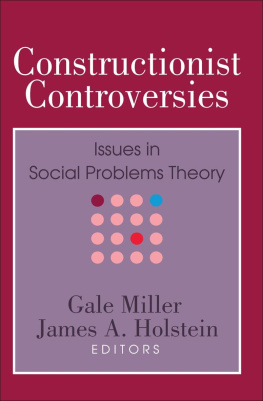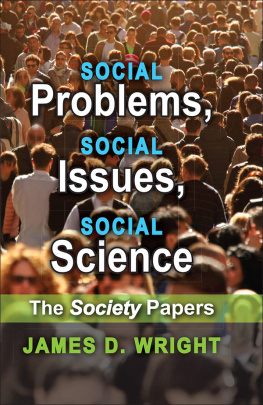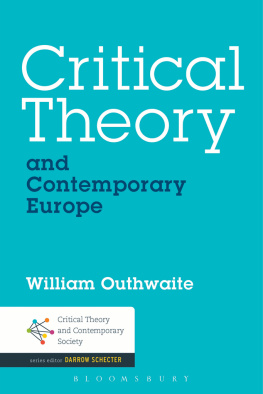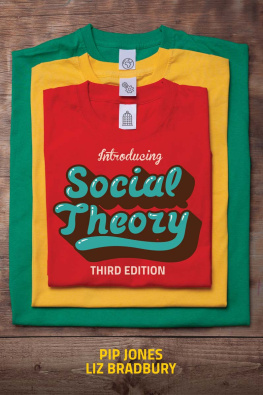Constructionist Controversies
First published 1993 by Transaction Publishers
Published 2017 by Routledge
2 Park Square, Milton Park, Abingdon, Oxon 0X14 4RN
711 Third Avenue, New York, NY 10017, USA
Routledge is an imprint of the Taylor & Francis Group, an informa business
Copyright 1993 by Taylor & Francis.
All rights reserved. No part of this book may be reprinted or reproduced or utilised in any form or by any electronic, mechanical, or other means, now known or hereafter invented, including photocopying and recording, or in any information storage or retrieval system, without permission in writing from the publishers.
Notice:
Product or corporate names may be trademarks or registered trademarks, and are used only for identification and explanation without intent to infringe.
Library of Congress Catalog Number: 92-36979
Library of Congress Cataloging-in-Publication Data
Miller, Gale.
Constructionist controversies : issues in social problems theory /
Gale Miller and James A. Holstein.
p. cm.(Social problems and social issues)
Includes bibliographical references and index.
ISBN 0-202-30457-4 (pbk. : alk. paper)
1. Social problems. 2. SociologyPhilosophy. I. Holstein, James A. II. Title. III. Series.
HN28.M55 1993
361.1dc20
92-36979
CIP
ISBN: 13: 978-0-202-30457-1 (pbk)
CONTENTS
Gale Miller and James A. Holstein
Peter R. Ibarra and John I. Kitsuse
Jaber F. Gubrium
Melvin Pollner
David Bogen and Michael Lynch
Joel Best
James A. Holstein and Gale Miller
Leslie J. Miller
Michal M. McCall
Herman Gray
Donileen R. Loseke
| Joel Best | Department of Sociology Southern Illinois University Carbondale |
| David Bogen | Humanities and Social Sciences Emerson College |
| Herman Gray | Sociology Board University of California Santa Cruz |
| Jaber F. Gubrium | Department of Sociology University of Florida |
| James A. Holstein | Department of Social and Cultural Sciences Marquette University |
| Peter R. Ibarra | Sociology Board University of California Santa Cruz |
| John I. Kitsuse | Sociology Board University of California Santa Cruz |
| Donileen Loseke | Department of Sociology, Anthropology and Social Work Skidmore College |
| Michael Lynch | Department of Sociology Boston College |
| Michal M. McCall | Department of Sociology Macalester College |
| Gale Miller | Department of Social and Cultural Sciences Marquette University |
| Leslie J. Miller | Department of Sociology University of Calgary |
| Melvin Pollner | Department of Sociology University of California Los Angeles |
This book rekindles some of the controversies that have animated the study of social problems for the past twenty years. The social constructionist approach to social problems theory has been both provocative and controversial since its introduction by John Kitsuse and Malcolm Spector during the 1970s. This volume reexamines constructionist theorizing and considers a variety of arguments it has generated. The cornerstone of the book is a paper by John Kitsuse and Peter Ibarra which addresses some of the major controversies that have emerged in recent years. The paper is a point of departure for further consideration of some of the disputes that continue to flourish.
This is a unique group of essays. The authors of this collectionand its companion volume, Reconsidering Social Constructionism: Debates in Social Problems Theory (Aldine de Gruyter 1993), represent diverse perspectives, but they share an interest in what the constructionist perspective on social problems has to offer. While the essays present a wide range of opinions, each offers a healthy dose of constructive criticism. Consequently, we hold little hope for resolving disputes, but rather hope to animate further debates and discussions.
This volume is organized around several recent controversies relating to the constructionist perspective. Part I offers a diverse set of commentaries on the perspective, beginning with Ibarra and Kitsuse's bold pronouncement on the state of constructionism and the directions it should pursue in the future. Other essays in the section raise a set of important issues that constructionists must engage if the perspective is to continue to be a productive source of social problems scholarship and research. Part II offers some provocative suggestions for expanding the constructionist program. Some of the essays call for extensions of familiar constructionist themes, while others bring ethnomethodological, poststructural, feminist, and critical perspectives into the constructionist picture.
Throughout the volume, our intent is to articulate alternative points of view on the constructionist project, using the arising tensions as opportunities for theoretical clarification and growth. Some of the perspectives represented here are not generally associated with the constructionist program, but we hope that bringing disparate approaches to bear on a common theme might provoke new ways of looking at, and doing, the sociology of social problems.
John Kitsuse has been at the forefront of the sociology of deviance and social problems since he arrived at Northwestern University in 1958. There, and later at the University of California at Santa Cruz, Kitsuse pursued a consistently radical program of constructionist studies that has transformed American sociology. While his work has clear affinities for what has come to be known as labeling theory," Kitsuse's analysis has been distinguished by its uncompromising constitutive emphasis. His early collaborations with Aaron Cicourel and, later, with Malcolm Spector, represent foundational pieces in the constructionist program that challenged the dominant sociological paradigms of the mid-twentieth century. Generations of sociologists are indebted to his clear and forceful articulations of the approach.
We are very much indebted to John for his work over the years, and for his contribution to this collection. Perhaps no higher tribute can be paid to a scholar than for his friends, colleagues, and detractors to get riled up over what he has to say. We think this collection is evidence that John Kitsuse can still provoke a good argument.
We have many people besides John and his coauthor, Peter Ibarra, to thank for making this project possible. Ron Troyer organized a social problems colloquium at the meetings of the Society for the Study of Social Problems in 1989 that sparked many of the debates that we have pursued in this collection. Some of the papers in the volume got their start at that session. We are deeply indebted to all the contributors to this book for their superb essays.
Getting a project of this magnitude into print is not an easy task. Joel Best, editor of Aldine de Gruyter's series in Social Problems and Social Issues" was enthusiastic about the project from the start. Executive Editor Richard Koffler has been a tremendous help in working out the details and making it possible to publish the two volume set. They deserve our special thanks. Finally, Arlene Perazzini and Mike Sola have done a superbly professional job in pulling this difficult project together into a final product.





